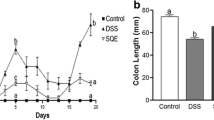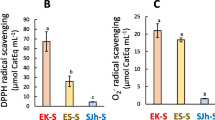Abstract
Background
Sichuan pepper [Zanthoxylum bungeanum; huājiāo (HJ)] is a widely used spice in China and has better antioxidative, anti-glycation, and bile acid-lowering properties than cumin and coriander seeds. HJ affects inflammation-related cytokines and caecal microbiota in mice fed a low-fibre and high-sucrose diet.
Methods and results
To determine the ameliorative effect of HJ on inflammatory bowel disease, C57BL/6 mice were divided into three groups and fed distilled water (control) or 3% (w/v) dextran sodium sulphate (DSS) in drinking water with normal chow containing 0% or 5% (w/w) HJ powder for seven days. After 6 days of feeding, diarrhoea, decreased body weight, and blood in faeces were observed in the DSS group. DSS treatment increased the spleen weight and damaged the colon tissue. These inflammatory indices were inhibited by HJ treatment. Amplicon sequencing of the 16S rDNA (V4) gene of the caecal content revealed a decrease in the alpha diversity (Simpson index D) in the DSS treatment group compared to the control group. The abundance of caecal Desulfovibrio, an inflammation-related genus, was higher and the caecal Lachnospiraceae and Bacteroides levels were lower in the DSS-treated mice than those in the control mice. However, HJ suppressed the DSS-induced changes in the caecal microbiota.
Conclusion
HJ intake contributes to the reduction in inflammation and maintenance of the gut microbiota. However, the strong antioxidant properties of phenolic compounds and fermentability of water-soluble dietary fibres in HJ and their relationship with other functional properties warrant further investigation.





Similar content being viewed by others
Data availability
The sequences were deposited in the DDBJ Sequence Read Archive (DRA) under the Accession Number DRA016994 (https://ddbj.nig.ac.jp/). The other data that support the findings of this study are available from the corresponding author upon reasonable request.
References
Singh N, Yadav SS (2022) A review on health benefits of phenolics derived from dietary spices. Curr Res Food Sci 5:1508–1523
Zhang D, Sun X, Battino M, Wei X, Shi J, Zhao L, Liu S, Xiao J, Shi B, Zou X (2021) A comparative overview on chili pepper (Capsicum Genus) and Sichuan pepper (Zanthoxylum Genus): from pungent spices to pharma-foods. Trends Food Sci Technol 117:148–162
Takamiya D, Takahashi H, Nakamura A, Xia Y, Kuda T (2023) Effect of Lactiplantibacillus plantarum fermentation on the in-vitro antioxidant and angiotensin I-converting enzyme-inhibitory properties of turmeric, coriander, cumin, and red chili pepper suspensions. Biocatal Agric Biotechnol 47:102610
Xia Y, Kuda T, Yamamoto M, Yano T, Nakamura A, Takahashi H (2023) Effect of Sichuan pepper on gut microbiota in mice fed a high-sucrose and low-dietary fibre diet. Appl Microbiol Biotechnol 107:2627–2638
Buie MJ, Quan J, Windsor JW, Coward S, Hansen TM, King JA et al (2023) Global hospitalization trends for Crohn’s disease and ulcerative Colitis in the 21st century: a systematic review with temporal analyses. Clin Gastroenterol Hepatol 21:2211–2221
Qiu P, Ishimoto T, Fu L, Zhang J, Zhang Z, Liu Y (2022) The gut microbiota in inflammatory bowel disease. Front Cell Infect Microbiol 12:733992
Quaglio AE, Grillo TG, De Oliviera ECS, Di Stasi LC, Sasaki LY (2022) Gut microbiota, inflammatory bowel disease and colorectal cancer. World J Gastroenterol 28:4053–4060
Xia B, Liu X, Li Z, Ren Z, Ren J, Liu X (2023) The effects of microbiota-targeted approaches in inflammatory bowel Disease: probiotics, probiotic foods, and prebiotics. Curr Opin Food Sci 49:100956
Sun J, Chen H, Kan J, Gou Y, Liu J, Zhang X, Wu X, Tang S, Sun R, Qian C, Zhang N, Niu F, Jin C (2020) Anti-inflammatory properties and gut microbiota modulation of an alkali-soluble polysaccharide from purple sweet potato in DSS-induced Colitis mice. Int J Biol Macromol 153:708–722
Qian Q, Qiu D, Wu Z, Yang H, Xie Y, Li S, Yin Y, Li X (2023) Apple polyphenol extract alleviates DSS-induced ulcerative Colitis and linked behavioral disorders via regulating the gut-brain axis. Food Biosci 53:102720
Li X, Meng L, Shen L, Ji H (2023) Regulation of gut microbiota by vitamin C, vitamin E and β-carotene. Food Res Int 169:112749
Bhatt S, Gupta M (2023) Dietary fiber from fruit waste as a potential source of metabolites in maintenance of gut milieu during ulcerative Colitis: a comprehensive review. Food Res Int 164:113229
Chen K, Zhang M, Ashikari B, Wang M (2022) Microencapsulation of Sichuan pepper essential oil in soybean protein isolate-Sichuan pepper seed soluble dietary fiber complex coacervates. Food Hydrocolloids 125:107421
Zhang Z, Liu J, Shen P, Cao Y, Lu X, Gao X, Fu Y, Liu B, Zhang N (2016) Zanthoxylum bungeanum pericarp extract prevents dextran sulfate sodium-induced experimental Colitis in mice via the regulation of TLR4 and TLR4-related signaling pathways. Int Immunopharm 41:127–135
Zhang H, Guo Z, Wang X, Xian J, Zou L, Zheng C, Zhang J (2022) Protective mechanisms of Zanthoxylum Bungeanum essential oil on DSS-induced ulcerative Colitis in mice based on a colonic mucosal transcriptomic approach. Food Funct 13:9324–9339
Mitra D, Skidar S, Chakraborty M, Das O, Samanta A, Dutta S (2023) Gum odina prebiotic prevents experimental Colitis in C57BL/6 mice model and its role in shaping gut microbial diversity. Food Biosci 53:102509
Sinclair L, Osman OA, Bertilsson S, Eiler A (2015) Microbial community composition and diversity via 16S rRNA gene amplicons: evaluating the illumina platform. PlosOne 10:e0116955
Poncheewin W, Hermes GDA, van Dam JCL, Koehorst JJ, Smidt H, Schaap PJ (2020) NG-Tax 2.0: a semantic framework for high-throughput amplicon analysis. Front Genet 10:1366
Oey O, Liu Y, Sunjaya AF, Simadibrata DM, Khattak MA, Gray E (2022) Gut microbiota diversity and composition in predicting immunotherapy response and immunotherapy-related Colitis in melanoma patients: a systematic review. World J Clin Oncol 13:929–942
Allodi M, Gioegio C, Incerti M, Corradi D, Flammini L, Ballabeni V, Barocelli E, Eadi M, Bertoni S (2023) Probing the effects of MR120 in preclinical chronic Colitis: a first-in-class anti-IBD agent targeting the CCL20/CCR6 axis. Eur J Pharmacol 945:175613
Choudhury HR, Sheikh NA, Bancroft GJ, Kats DR, de Souza JB (2000) Early nonspecific immune responses and immunity to blood-stage nonlethal Plasmodium yoelii Malaria. Infect Immun 68:6127–6132
Gerges SH, Tolba MF, Elsherbiny DA, El-Demerdash E (2020) The natural flavonoid galangin ameliorates dextran sulphate sodium–induced ulcerative Colitis in mice: effect on toll-like receptor 4, inflammation and oxidative stress. Basic Clin Pharmacol Toxicol 127:10–20
Xu H, Huang H, Liu Y, Zhu J, Zhou Y, Chen H, Xu J, Zhao H, Guo X, Shi W, Nie Y, Zhou Y (2021) Selection strategy of dextran sulfate sodium-induced acute or chronic Colitis mouse models based on gut microbial profile. BMC Microbiol 21:279
Yamamoto M, Ogura H, Kuda T, Xia Y, Takahashi H, Inoue J, Takayanagi S (2023) Effects of roasted burdock root tea, drink, and the residue on caecal microbiota of mice fed low-dietary fibre diet. Food Chem Adv 3:100376
Cheng H, Zhang D, Wu J, Zhou Y, Tan Y, Feng W, Peng C (2023) Interactions between gut microbiota and polyphenols: a mechanistic and metabolomic review. Phytomedicine 119:154979
El-Salhy M, Mazzawi T, Hauken T, Hatlebakk JG (2022) The fecal microbiota transplantation response differs between patients with severe and moderate irritable bowel symptoms. Scand J Gastroenterol 57:1036–1045
Ma L, Ni Y, Wang Z, Tu W, Ni L, Zhuge F, Zheng A, Hu L, Zhao Y, Zheng L, Fu Z (2020) Spermidine improves gut barrier integrity and gut microbiota function in diet-induced obese mice. Gut Microb 12:1832857
Wang L, An J, Song S, Mei M, Li W, Ding F, Liu S (2020) Electroacupuncture preserves intestinal barrier integrity through modulating the gut microbiota in DSS-induced chronic Colitis. Life Sci 261:118473
Liu Z, Jiang Z, Zhang Z, Liu T, Fan Y, Liu T, Peng N (2022) Bacillus coagulans in combination with chitooligosaccharides regulates gut microbiota and ameliorates the DSS-induced Colitis in mice. Microbiol Spect 10:00641
Wan C, Qian W, Liu W, Pi X, Tang M, Wang X, Gu Q, Li P, Zhou T (2023) Exopolysaccharide from Lactobacillus rhamnosus ZFM231 alleviates DSS-induced Colitis in mice by regulating gut microbiota. J Sci Food Agric 102:7087–7097
Bronsart L, Nguyen L, Habtezion A, Contag C (2016) Reactive oxygen species imaging in a mouse model of inflammatory bowel disease. Mol Imag Biol 18:473–478
Harada M, Kuda T, Nakamura A, Lee G, Takahashi H, Kimura B (2021) In vitro antioxidant and immunomodulation capacities of low-molecular weight-alginate- and laminaran-responsible gut indigenous bacteria. LWT-Food Sci Technol 151:112127
Wang H, Wang Q, Yang C, Guo M, Cui X, Jing Z, Liu Y, Qiao W, Qi H, Zhang H, Zhang X, Zhao N, Zhan M, Chen M, Zhang S, Xu H, Zhao L, Qiao M, Wu Z (2022) Bacteroides acidifaciens in the gut plays a protective role against CD95-mediated liver injury. Gut Microbes 14:2027853
Chen K, Nakasone Y, Yi S, Ibraham HR, Sakao K, Hossain MA, Hou D (2022) Natural garlic organosulfur compounds prevent metabolic disorder of lipid and glucose by increasing gut commensal Bacteroides acidifaciens. J Agric Food Chem 70:5829–5837
Takei MN, Kuda T, Taniguchi M, Nakamura S, Takahashi H, Kimura B (2020) Detection and isolation of low molecular weight alginate- and laminaran susceptible gut indigenous bacteria from ICR mice. Carbohydr Polym 238:116205
Funding
The study was funded by Yamazaki Spice Promotion Foundation, Tokyo, Japan.
Author information
Authors and Affiliations
Contributions
AM, YX, and TK: Conceptualisation, Methodology, Validation, Formal analysis, Investigation, Resources, Data curation, Writing—original draft, Visualisation. MY: Formal analysis, Investigation. AN and HT: Conceptualisation, Methodology, Supervision.
Corresponding author
Ethics declarations
Conflict of interest
The authors declare that they have no known competing financial interests or personal relationships that could have appeared to influence the work reported in this paper.
Ethical approval
This study was approved by the Animal Experiment Committee of the Tokyo University of Marine Science and Technology (Approval No. R3-1).
Additional information
Publisher’s Note
Springer Nature remains neutral with regard to jurisdictional claims in published maps and institutional affiliations.
Rights and permissions
Springer Nature or its licensor (e.g. a society or other partner) holds exclusive rights to this article under a publishing agreement with the author(s) or other rightsholder(s); author self-archiving of the accepted manuscript version of this article is solely governed by the terms of such publishing agreement and applicable law.
About this article
Cite this article
Miyashita, A., Xia, Y., Kuda, T. et al. Effects of Sichuan pepper (huājiāo) powder on disease activity and caecal microbiota of dextran sodium sulphate-induced inflammatory bowel disease mouse model. Mol Biol Rep 51, 126 (2024). https://doi.org/10.1007/s11033-023-09103-y
Received:
Accepted:
Published:
DOI: https://doi.org/10.1007/s11033-023-09103-y




